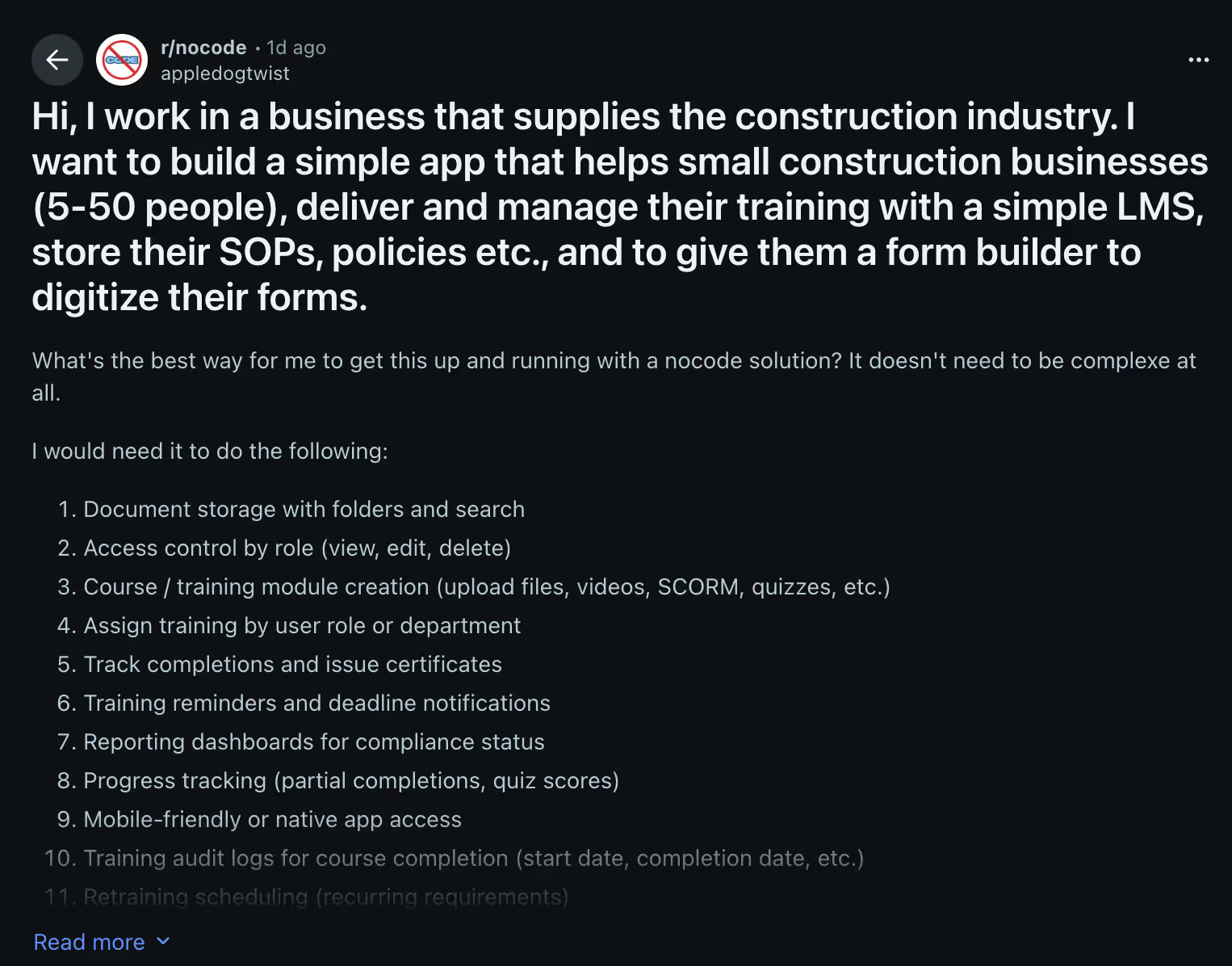
"I want to build a simple app that helps small construction businesses (5-50 people), deliver and manage their training with a simple LMS, store their SOPs, policies etc., and to give them a form builder to digitize their forms."
This straightforward request posted on r/nocode by a construction industry professional sparked a conversation that's resonating across small business communities. The user's frustration? Traditional learning management systems are expensive while offering features construction crews will never use—virtual classrooms, gamification, and complex course authoring tools designed for corporate training departments, not job sites.

The post exposed a painful reality facing small construction businesses nationwide. They need basic training delivery, accessible SOPs, and mobile-friendly forms that work offline. Instead, they're offered bloated enterprise platforms requiring IT support and CFO approval just to digitize safety checklists.
Construction faces a skilled labor shortage while regulatory compliance demands only increase. OSHA citations for inadequate training are costly. Meanwhile, paper-based training records and SOPs create audit nightmares that can shut down job sites overnight.
The traditional solution—buying expensive LMS software—doesn't fit small business budgets or operational reality. Enterprise platforms assume workers sit at desks completing hour-long courses. Construction reality means delivering bite-sized safety updates to crews spread across multiple sites, all accessing content from smartphones between tasks.
Traditional LMS Offers:
What Construction Really Needs:
Rather than adapting operations to fit software limitations, small construction businesses are building custom systems using no-code platforms. The approach flips traditional software purchasing on its head—instead of paying for features you don't need, you build only what matters for your specific operation.
Here's the key advantage: while third-party LMS apps are purpose-built for training only, platforms like Clappia offer comprehensive versatility. The same system handling your training can also manage GPS-based employee attendance tracking, field sales verification with location stamps, live tracking of field teams, inventory management, daily inspection reports, and equipment maintenance workflows. This means you're building an entire operational ecosystem, not just solving one isolated problem.
Training Content Delivery
Workers access training through a mobile app showing required topics:
Each training item combines multiple content types. A rich text editor displays step-by-step procedures. Below that, a video viewer plays demonstration footage. Reference manuals appear through a PDF viewer that workers download for offline access.
After reviewing content, workers confirm completion. The system automatically records everything with timestamps, creating audit-ready documentation. Supervisors receive email notifications when employees finish required training—no more manual tracking spreadsheets.
Document Repository for SOPs
A separate app functions as the central document library. Unlike files scattered across Google Drive folders, this organizes specifically for job site access:
Access controls ensure appropriate visibility. General laborers see basic safety procedures. Supervisors access quality specifications. Project managers view everything including contracts and submittals. The access control features make this security straightforward to configure.
Digital Forms That Actually Work
Paper forms plague construction—lost in truck cabs, damaged by weather, illegibly filled out. Digital forms solve these problems while adding capabilities impossible with paper.
Safety inspection checklists use:
Work permits combine dropdown selections for work type, checkboxes for required precautions, and signature capture from workers and supervisors. Completed permits route through approval workflows automatically—hot work permits go to fire watch coordinators while confined space permits route to entry supervisors.
Here's where the system becomes powerful. Instead of isolated apps, everything connects through automated workflows:
These automated workflows eliminate the manual coordination that consumes supervisor time. No more checking spreadsheets to verify who completed what training. No more chasing down workers about expiring certifications. No more manually creating maintenance requests from inspection findings.
Small construction businesses implementing these custom systems report surprising outcomes:
Cost Savings
Time Savings
Compliance Improvements
The beauty of no-code platforms is that construction managers—not IT departments—build these systems. With platforms like Clappia, you simply drag and drop fields onto your form canvas, configure each field's properties, set up your automation rules and workflows, test the system with your team, and if everything works as expected, start using it immediately.
Identify Your Critical Needs
Start by listing your three biggest pain points:
Build Your First App
Begin with your highest-priority need. If daily safety inspections cause the most problems, digitize that form first. Using the form builder, you'll add fields like dropdowns for equipment selection, checkboxes for inspection items, photo fields for documentation, and date/time stamps for compliance records.
Test it with one crew, gather feedback, and adjust immediately. Unlike traditional software where changes require developer intervention, you simply modify fields, update workflow logic, and republish within minutes.
Expand and Automate
Add your second app. Connect them through workflows. When workers complete safety training, automatically grant access to inspection forms. Use conditional workflows to route different form types to appropriate supervisors. Watch manual coordination disappear as automation handles task assignments, notifications, and data routing.
Train Your Team
Focus on supervisors first—they become system champions. They'll answer field questions and encourage adoption. Workers adopt new tools when they see clear benefits: faster approvals, less duplicate data entry, immediate access to needed information.
The mobile-first design means workers already know how to use it. If they can use their smartphone, they can use your custom apps. No thick training manuals or mandatory computer courses required.
Large construction companies have IT departments that can customize enterprise software. They have substantial budgets for major implementations. Small businesses don't—and that's becoming an advantage.
Without legacy systems to protect, small teams move faster. A project manager who understands actual field needs builds better solutions than enterprise software designed by developers who've never worn a hard hat. The Reddit user who sparked this discussion isn't waiting for perfect software—they're building exactly what their crew needs, adjusting as they learn what works.
This represents a broader shift happening across industries. Workers closest to actual operations are building their own tools instead of adapting to generic software. The results prove that understanding your specific workflow matters more than buying the most feature-rich platform.
Here's what sets comprehensive no-code platforms apart from specialized software: versatility that grows with your business needs.
That same construction company building their training system discovered they could use Clappia for far more:
Third-party apps require separate subscriptions for each function. You'd need one platform for training, another for forms, another for tracking, another for inspections. Each with its own login, its own mobile app, its own data silos. Integration between them? Good luck—you'll need custom API development.
With comprehensive platforms, everything lives in one ecosystem. Data flows seamlessly between apps. A worker's training completion automatically updates their access permissions across all forms. Equipment inspections trigger maintenance workflows that create work orders in your operations app. Field sales data connects with customer records for complete visibility.
As more small construction businesses adopt these approaches, expect ripple effects across the industry. Software vendors will face pressure to simplify offerings or lose market share to no-code alternatives. Regulatory agencies may start expecting digital compliance records as the norm rather than exception. Construction insurance companies might offer premium discounts for businesses with documented digital training systems.
The bigger story is about control. Small businesses no longer depend on software vendors to solve their problems. They're taking ownership of their operational technology, building systems that actually fit their needs, and keeping costs manageable in the process.
The construction manager who posted that Reddit question wasn't asking for permission to build their own solution. They were asking which tool to use. That mindset shift—from software buyer to system builder—is transforming how small businesses operate.
While we can't provide exact pricing (it varies by scale and needs), the comparison is clear:
Traditional Enterprise LMS:
Custom No-Code Solution:
The savings extend beyond direct costs. Consider time savings from automation, reduced errors from eliminating paper processes, and compliance improvements that prevent citations and project delays.
Start building your construction training and document system today—no coding required, no IT support needed, and significantly more affordable than enterprise software.
The Reddit user who sparked this conversation represents thousands of business owners tired of being told their needs don't matter unless they have enterprise budgets. They're proving that the best solutions come from people who actually do the work, not from software companies guessing at what construction needs.
With no-code platforms, you can start building immediately. Drag fields onto forms. Configure properties. Set up workflows. Test with your team. Launch and iterate. The tools that once required developer teams are now accessible to anyone willing to learn a visual interface.
Your construction business deserves software that works the way you work—not the other way around. Stop adapting your operations to generic platforms. Build exactly what you need, when you need it, and adjust it as your operations evolve.
The future of construction technology isn't about buying better software. It's about building your own.

L374, 1st Floor, 5th Main Rd, Sector 6, HSR Layout, Bengaluru, Karnataka 560102, India

3500 S DuPont Hwy, Dover,
Kent 19901, Delaware, USA


3500 S DuPont Hwy, Dover,
Kent 19901, Delaware, USA

L374, 1st Floor, 5th Main Rd, Sector 6, HSR Layout, Bengaluru, Karnataka 560102, India


.jpg)
.jpg)

.jpg)

.jpg)